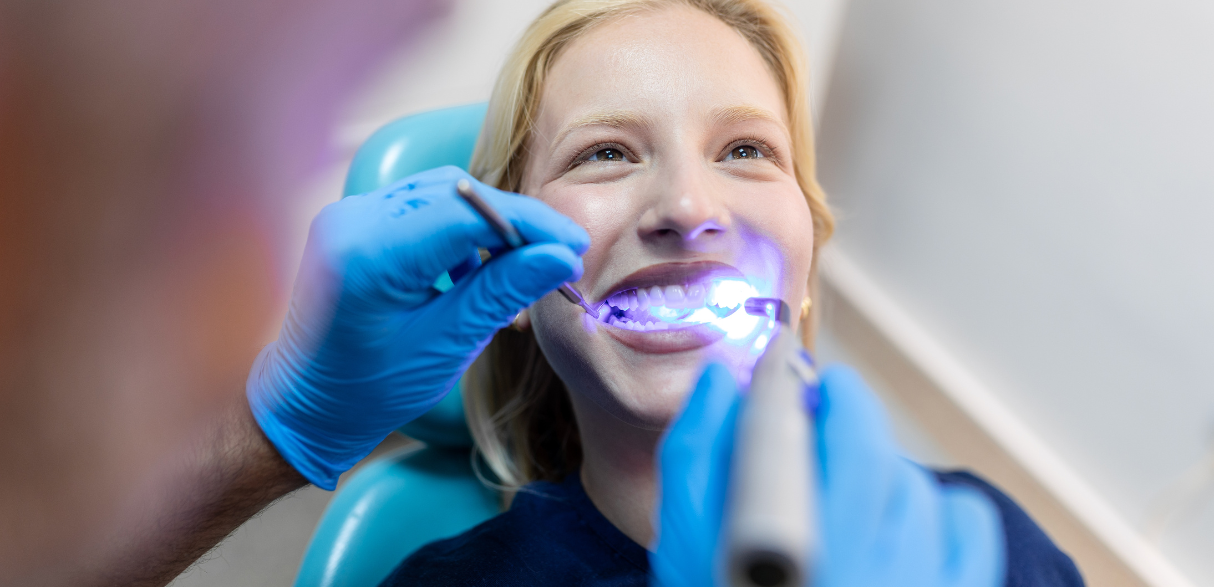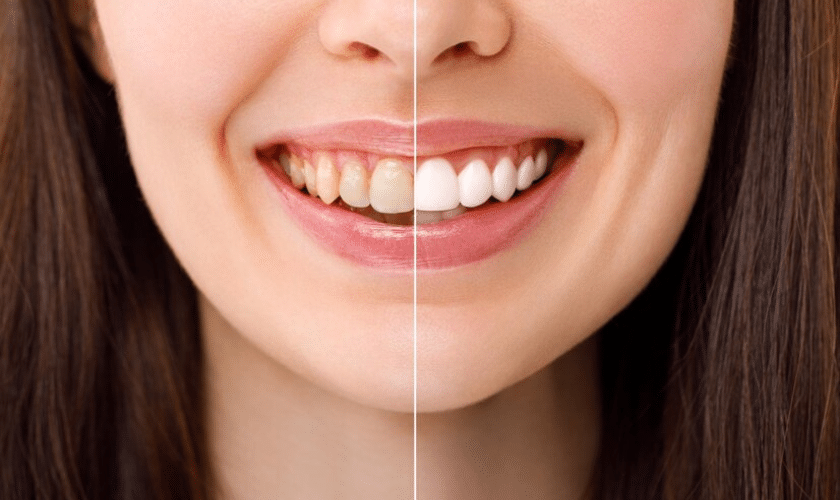
A widespread and reasonably priced procedure to improve the appearance of stained teeth is teeth whitening. Treatments purchased over the counter may be risky and less effective. Your dentist will provide the most secure, efficient treatment.
What Is Teeth Whitening?
Teeth whitening leads to whiter teeth and can help remove discoloration. Following treatment, the teeth typically seem a few shades whiter but not completely white. The practice of bleaching your teeth is elective; it is rarely necessary. Hydrogen peroxide or carbamide peroxide is the active ingredient in whitening products. The most concentrated, and hence most potent, whitening solutions can only be used legally by licensed dental professionals. The bleach penetrates the tooth’s outer layer of enamel and enters the dentine, which is the bulk of the inside and is slightly softer than the enamel. The discoloration is brought on by the bleach’s reaction with colored molecules. As a result, the dentine gets paler, and the teeth appear whiter. The enamel surface might appear whiter by being more reflective with bleach.
What Are The Causes Of Teeth Stains?
- Food & Drink: Red wine, dark sodas, coffee, tea, and fruits and vegetables have all been linked to stained teeth.
- Tobacco: Smoking cigarettes and using chewing tobacco both have the potential to stain teeth.
- Oral hygiene: Tooth discoloration can be caused by poor dental hygiene, such as inadequate brushing or flossing.
- Trauma or Illness: Discolored teeth can result from any injury, ailment, or disease that impairs a child’s enamel development, whether in the womb or while the tooth is still developing (under the age of 8). Discolored teeth can also result from trauma to adult teeth. Additionally, a few illnesses and medical procedures might result in stained teeth. For instance, radiation and chemotherapy can stain teeth.
- Medical procedures: Occasionally, medical practices can cause dental stains.
What Are The Different Types Of Teeth Whitening Procedures?
- Teeth whitening kits
- Tooth whitening strips
- Tooth whitening toothpaste
- Laser teeth whitening
- Charcoal teeth whitening
- Coconut oil teeth whitening
What Are The Benefits?
- This cosmetic dental treatment usually provides a nearly instant confidence boost. Whiter teeth can also convey to others that you take care of yourself and care about your appearance, so you won’t have to hesitate to smile as much.
- After the procedure, you could feel more motivated to brush, floss, and keep your six-month preventative dentist appointments to take good care of your whiter and brighter teeth.
- The benefit of this procedure is that you may perform it on your schedule. If you use at-home teeth whitening kits, contrary to what you may believe, professional teeth whitening does not require additional dental appointments.
- A trip to the dentist for this procedure can have you leaving the office with a brighter smile in just a few hours, saving you time and money on unreliable results.
- Many over-the-counter treatments have the potential to be helpful. Still, if they are not taken properly, they can have adverse side effects such as increased sensitivity, gum irritation, enamel erosion, and uneven color.
How Long Does Tooth Whitening Last?
The benefits of tooth whitening might last anywhere from 6 months to 2-3 years. From person to person, it differs. Things that will quickly discolor your teeth and make the effects of temporary whitening include:
- Smoking
- Dark beverages, such as coffee, red wine, and tea.
- Staining products like berries and beets.
Maintaining your whitening for as long as possible will require brushing your teeth twice a day, avoiding these foods, but not eliminating them. But remember that stains will inevitably appear.
Procedures for tooth whitening offer a conservative method for improving appearance. These cosmetic dental methods work well alongside other therapeutic strategies and on their own. The bleaching agent’s concentration and exposure time duration affect how effectively tooth bleaching works to whiten teeth.



